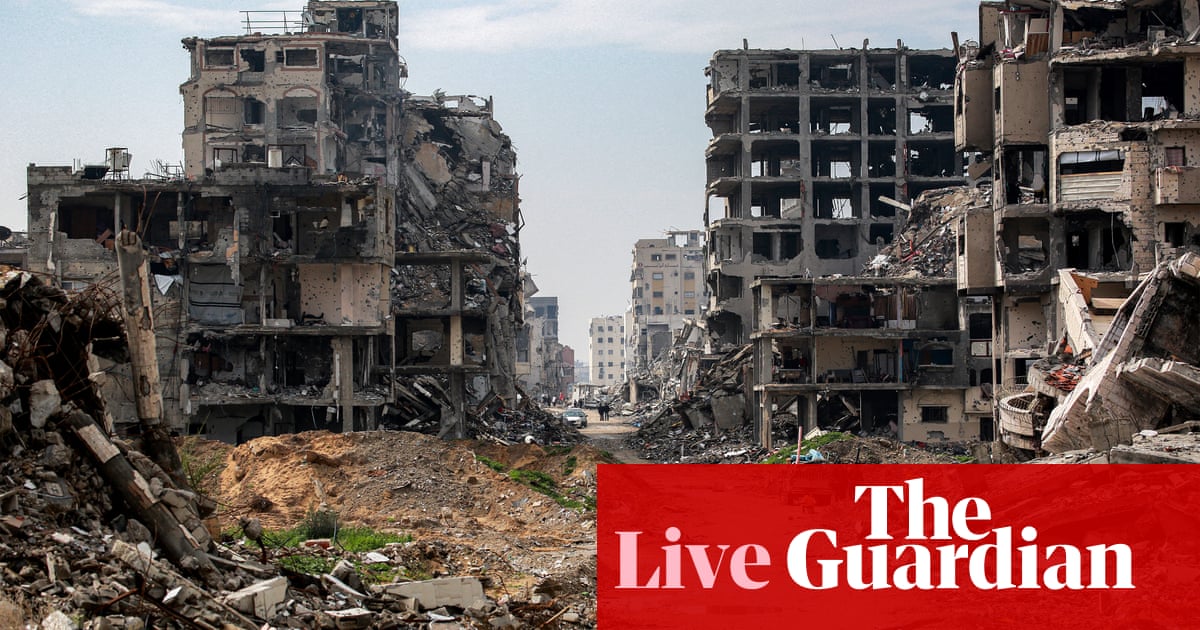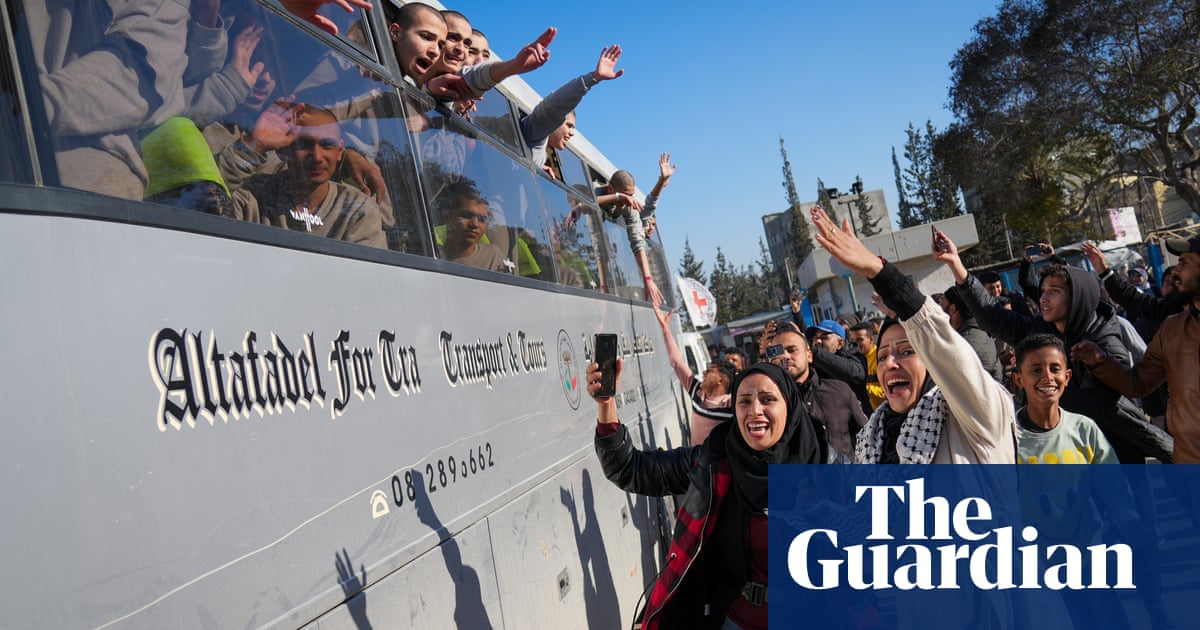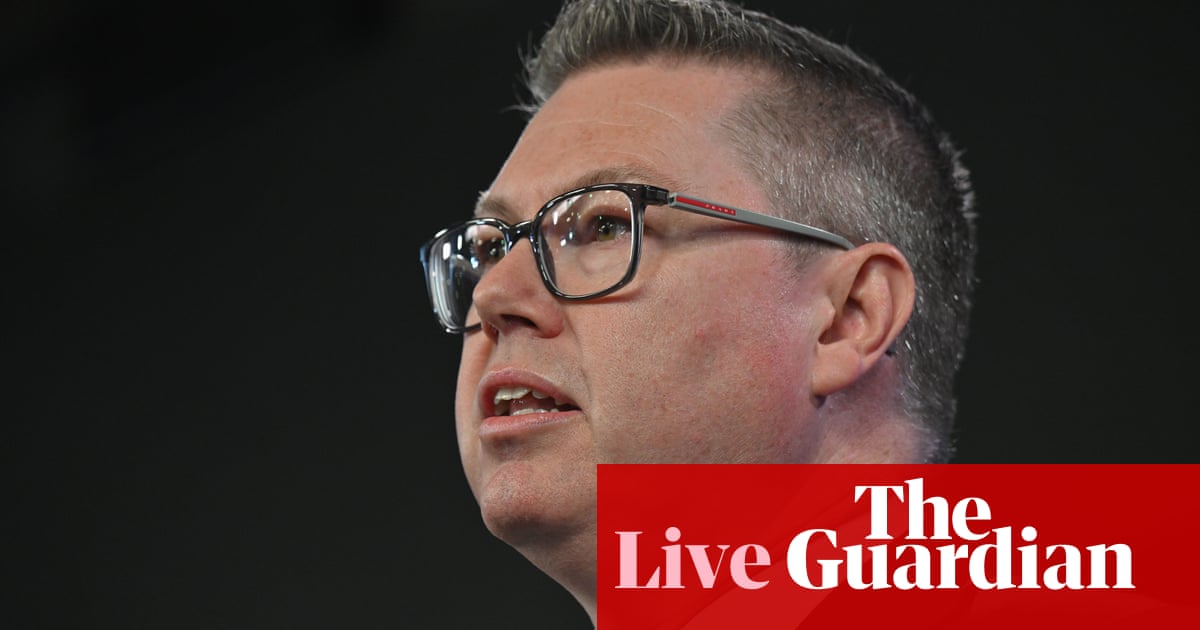Hamas releases names of three Israelis to be released on Saturday
Hamas’s armed wing spokesperson has named the three Israeli hostages to be released on Saturday as Sagui Dekel-Chen, Iair Horn and Alexandre Sasha Troufanov, reports Reuters.
More details soon …
Key events
We have more on the three Israeli hostages to be released on Saturday.
A statement from prime minister Benjamin Netanyahu’s office said Israel accepted the list, Agence France-Presses reports.
Hamas releases names of three Israelis to be released on Saturday
Hamas’s armed wing spokesperson has named the three Israeli hostages to be released on Saturday as Sagui Dekel-Chen, Iair Horn and Alexandre Sasha Troufanov, reports Reuters.
More details soon …
Hostage release: Hamas and Islamic Jihad announce further details
Three hostages will be released on Saturday, in accordance with the terms of the Gaza ceasefire, including US-Israeli Sagui Dekel-Chen, a Hamas official said, according to Reuters.
Separately, the Islamic Jihad group said it would release Russian-Israeli Alexandre Sasha Troufanov as part of the deal, reports Reuters.
More details soon …
Turkey will not allow terrorist organisations to take shelter in northern Syria and will not hesitate to take action in that regard, Turkish president Recep Tayyip Erdoğan said, according to Reuters.
The new Syrian administration under Ahmed al-Sharaa appears to be determined to fight those terrorist organisations, Erdoğan said, according to a transcript of his remarks to journalists on his return flight from a trip to Malaysia, Indonesia and Pakistan.
Erdoğan added that he discussed steps to be taken against those organisations during his meeting with Sharaa in Ankara earlier this month.
Initial proposals shared with Reuters by its three Egyptian security sources relating to Gaza’s reconstruction and financing appear advanced. According to the news agency’s sources, abuffer zone and physical barrier would be erected to stop tunnels being built across Gaza’s border with Egypt. As soon as rubble is removed, 20 areas would be established as temporary living zones. About 50 Egyptian and other foreign companies would be brought in to carry out the work, they added.
Financing would involve international and Gulf money, a regional source with knowledge of the matter told Reuters. A potential fund could be named the Trump Fund for Reconstruction, the Arab government official said.
However, the most difficult issues around Gaza’s governance and internal security remain to be decided, the official told the news agency. Forcing Hamas out of any role in Gaza would be critical, said the Arab official and the three Egyptian sources.
Hamas has previously said it is willing to cede government in Gaza to a national committee, but it would want a role in choosing its members and would not accept the deployment of any ground forces without its consent.
The three Egyptian sources told Reuters that while nothing in the plan was very new, they believed it was good enough to change US president Donald Trump’s mind and that it could be imposed on Hamas and the Palestinian Authority under Mahmoud Abbas.
The Guardian has been unable to independently verify Reuters’ report.
Continuing from the last post, Reuters reports, citing three Egyptian security sources, that the latest Egyptian proposal involves forming a national Palestinian committee to govern Gaza without Hamas involvement, international participation in reconstruction without displacing Palestinians abroad, and movement towards a two-state solution.
Saudi Arabia, Egypt, Jordan, the United Arab Emirates and Palestinian representatives will review and discuss the plan in Riyadh before it is presented at a scheduled Arab summit on 27 February, an Arab government source told Reuters.
The role of Saudi crown prince Mohammed bin Salman is shaping up to be key, reports Reuters. “We are telling the Americans we have a plan that works. Our meeting with MbS [Prince Mohammed] is going to be critical. He is taking the lead,” a Jordanian official told the news agency.
Prince Mohammed had a warm relationship with the first Trump administration and is increasingly central to Arab ties with the United States during the new Trump era, according to Reuters. Long a major regional partner for the US, Prince Mohammed is expanding Saudi Arabia’s relationship through business and global power politics.
Saudi Arabia’s sovereign wealth fund is holding a conference in Miami this month that Reuters revealed Trump is expected to attend. Riyadh is also expected to host his coming talks with Russian president Vladimir Putin to try to end the Ukraine war. The White House did not respond to several requests for comment on this story, according to Reuters.
US secretary of state Marco Rubio, speaking on Thursday, referred to the coming Arab meeting, saying:
Right now the only plan – they don’t like it – but the only plan is the Trump plan. So if they’ve got a better plan, now’s the time to present it.”
Spokespeople for Saudi Arabia, Egypt, Jordan, the UAE and Israel did not immediately respond to Reuters’ requests for comment.
Saudi Arabia spearheads Arab scramble for alternative to Trump’s Gaza plan
Saudi Arabia is spearheading urgent Arab efforts to develop a plan for Gaza’s future as a counter to US president Donald Trump’s ambition for a “Riviera of the Middle East” cleared of its Palestinian inhabitants, 10 sources told Reuters.
Draft ideas will be discussed at a meeting in Riyadh this month of countries including Saudi Arabia, Egypt, Jordan and the United Arab Emirates. Proposals may involve a Gulf-led reconstruction fund and a deal to sideline Hamas, five of the people told the news agency.
Saudi Arabia and its Arab allies were aghast at Trump’s plan to “clean out” Palestinians from Gaza and resettle most of them in Jordan and Egypt, an idea immediately rejected by Cairo and Amman and seen in most of the region as deeply destabilising.
The dismay in Saudi Arabia was aggravated, sources told Reuters, because the plan would nix the kingdom’s demand for a clear path to Palestinian statehood as a condition to normalise ties with Israel – something that would also pave the way for an ambitious military pact between Riyadh and Washington, shoring up the kingdom’s defences against Iran, explains Reuters.
Reuters spoke to 15 sources in Saudi Arabia, Egypt, Jordan and elsewhere to build a picture of the hurried efforts by Arab states to pull together existing proposals into a new plan they can sell to the US president – even potentially calling it a “Trump plan” to win his approval.
All the sources declined to be identified by Reuters because the issue involves international or domestic sensitivities and they were not authorised to speak in public.
One Arab government source told Reuters that at least four proposals had already been drafted for Gaza’s future, but an Egyptian proposal was now emerging as central to the Arab push for an alternative to Trump’s idea.

Julian Borger
The Israeli government has signalled it intends to stick to the hostage release schedule agreed in the ceasefire deal with Hamas, but warned that if the anticipated three surviving hostages were not released on Saturday, it would go back to war in Gaza.
The statement from the prime minister’s office ends nearly three days of confusion after Donald Trump’s declaration that Israel should demand Hamas release all the remaining hostages, more than 70 people, by Saturday or failing that, end the ceasefire.
Since Trump’s remarks, Benjamin Netanyahu and his government had been vague on how many hostages they wanted released on Saturday, but a spokesperson, David Mencer, confirmed on Thursday that the Israeli demand was for three hostages as laid out in the timetable of the ceasefire agreement.
“There is a framework in place for the release of our hostages,” Mencer said. “That framework makes clear that three live hostages must be released by Hamas terrorists on Saturday.”
Earlier this week Hamas had suggested there might be an indefinite delay in the release of the next three hostages due to violations by the Israel Defense Forces (IDF), but it backpedalled on that threat on Thursday and confirmed the timetable would remain on track.
We have reported a lot about Palestinians returning to Gaza following the latest ceasefire that came into effect on 19 January.
This drone photograph, taken after the commencement of the ceasefire shows the landscape that Palestinians are returning to in northern Gaza:
Here are some images coming in via the newswires:
Fourteen Palestinian children flown to Italy for medical treatment
Fourteen Palestinian children, many with cancer, have been flown to Italy for medical treatment, the latest among dozens brought from Gaza after the Hamas-Israel war, the foreign ministry said on Friday.
The children and their families, a total of 45 people, had on Wednesday crossed the Rafah border from Gaza into Egypt, where they underwent medical checks at the Italian hospital in Cairo, officials said, according to Agence France-Presse (AFP).
They were flown to Italy on an Italian military plane, and greeted at Rome’s Ciampino airport on Thursday evening by foreign minister Antonio Tajani.
Treating the children was part of Italy’s efforts to promote peace and dialogue in the region, he said on Friday, a “diplomacy made of solidarity, which restores hope to the most fragile and defenceless”.
Some of the children were due to be treated in the capital, the others heading north for treatment in hospitals including in Turin and Milan, a ministry spokesperson said.
Two of the children disembarked in Rome were headed for the Vatican’s Bambino Gesu hospital, which treated nine other Palestinian children last year. All those nine, ranging from one to 15 years old, have been discharged, a hospital spokesperson told AFP.
“Every child we bring to Italy is a sign of hope, a commitment to life and the future,” Italian defence secretary Guido Crosetto said.
Agence France-Presse (AFP) have some more detail on the comments today by the International Committee of the Red Cross (ICRC).
In a statement on X, the ICRC wrote:
We have consistently reiterated that release and transfer operations should be carried out in a dignified and safe manner.
The ICRC will continue our efforts to see all hostages released, until the last hostage is returned.”
The ICRC has facilitated the ongoing hostage-prisoner swaps between Israel and Hamas.
Since the ceasefire between Israel and Hamas took effect on 19 January, the two sides have conducted five hostage-prisoner swaps.
During the fifth exchange on 8 February, Hamas forced three hostages to thank their captors in front of crowds of Palestinians gathered to witness their release in Gaza.
The emaciated appearance of the hostages prompted the ICRC to call on Hamas to ensure subsequent swaps are more private and dignified. The next hostage-prisoner swap is scheduled for Saturday.
Red Cross says ‘very concerned’ about condition of hostages in Gaza
The International Committee of the Red Cross (ICRC), which has facilitated the ongoing hostage-prisoner swaps between Israel and Hamas, said on Friday it was “very concerned” about the condition of the remaining hostages held in Gaza, reports Agence France-Presse (AFP).
“The latest release operations reinforce the urgent need for ICRC access to those held hostage. We remain very concerned about the conditions of the hostages,” the Red Cross said in a statement on X.
Palestinian booksellers decry detention by Israeli police over ‘public disorder’

Julian Borger
Two Jerusalem booksellers detained this week on charges their books were causing “public disorder” have said the experience reflected an intensifying campaign by the Israeli government against Palestinian culture and free speech.
Mahmoud Muna and his nephew Ahmed, whose family has owned the Educational Bookshop for more than 40 years, spent two days in detention and will remain under house arrest until Sunday, despite the absence of evidence to support the vague accusations against them.
At about 3pm last Sunday, plainclothes police raided two branches of the shop on East Jerusalem’s Salah Eddin Street, one selling books in Arabic, and the other selling works in English and other foreign languages.
“They started going through the books and if they were of no interest to them, they would just throw them on the floor,” said Ahmed Muna, 33.
The raids triggered international outrage. Over generations, the Educational Bookstore has become a respected institution, selling academic, historical and political works and fiction alongside espresso coffee and teas to students, tourists, journalists and foreign diplomats. There were street protests after the raid and at least nine diplomats from the UK and other European countries attended the Munas’ court hearing.
Some analysts suggested the targeting of the bookshop was a measure of the increasing radicalisation of the country’s coalition government, which includes far-right parties.
Israeli journalist Noa Simone called the raid a “fascist act”, adding that it “evokes frightening historical associations with which every Jew is very familiar”.
You can read the full report by Julian Borger and Quique Kierszenbaum in Jerusalem here:
If fighting in Gaza resumes, Israeli defence minister Israel Katz said it would end in the “defeat of Hamas and the release of all the hostages”. “It will also allow the realisation of US President Trump’s vision for Gaza,” he added, according to Agence France-Presse (AFP).
Katz last week ordered the Israeli army to prepare for “voluntary” departures from Gaza, and the military said it has already begun reinforcing its troops around the territory.
Yemen’s Houthi rebels threatened on Thursday to launch new attacks on Israel if it and the United States went ahead with US president Donald Trump’s Gaza plan.
The ceasefire’s six-week first phase has seen Israeli hostages released in small groups in exchange for Palestinians in Israeli prisons.
The two sides, which have yet to agree on the next phases of the truce, have traded accusations of violations, spurring concern that the violence could resume.
On Thursday, for the first time since the truce began, Israel’s military said it identified a rocket launch from Gaza. The rocket landed back inside the Palestinian territory and the military later said it had struck the launcher.
In Israel, dozens of relatives of hostages held in Gaza blocked a highway near Tel Aviv, waving banners and demanding the terms of the ceasefire be respected, an AFP journalist said.
Hamas has called for worldwide “solidarity marches” over the weekend to denounce “the plans to displace our Palestinian people from their land”.
Hamas expected to name Israeli hostages it will free this weekend
Hamas is expected on Friday to name three hostages it will release this weekend as part of a planned exchange for Palestinian prisoners and detainees, according to local media.
Israeli media reported on Thursday that Hamas was to name three hostages it would release on Saturday, after it reiterated its commitment to the ceasefire and to carrying out the next exchange “according to the specified timetable”.
“We are keen to implement it (the ceasefire) and oblige the occupation to fully abide by it,” Hamas spokesperson Abdel Latif al-Qanou said, adding that mediators were pushing for Israel “to resume the exchange process on Saturday”.
Israel warned on Thursday that Hamas must release three living hostages this weekend or face a resumption of the war in Gaza, after Hamas said it would pause releases over apparent Israeli violations of the truce.
“If those three are not released, if Hamas does not return our hostages, by Saturday noon, the ceasefire will end,” said government spokesperson David Mencer, reports Agence France-Presse (AFP).
Hamas had previously accused Israel of holding up the delivery of heavy machinery needed to clear war debris, with bulldozers reportedly lining up at Egypt’s Rafah border crossing with Gaza waiting to enter.
Opening summary
Hamas is expected today to name three hostages it will release this weekend as part of a planned exchange for Palestinian prisoners and detainees, local media said, after days of uncertainty in which Israel threatened to scrap a nearly month-old Gaza ceasefire deal.
Israel warned on Thursday that Hamas must release three living hostages this weekend or face a resumption of the war in Gaza, after Hamas said it would pause releases over apparent Israeli violations of the truce.
The 19 January ceasefire, which largely halted 15 months of fighting in Gaza, has been under heightened pressure since US president Donald Trump proposed a US takeover of the territory.
According to Agence France-Presse (AFP), Israeli media reported on Thursday that Hamas was to name three hostages it would release on Saturday, after it reiterated its commitment to the ceasefire and to carrying out the next exchange “according to the specified timetable”.
More on that in a moment. First, here are the other key updates:
-
The Israeli government has signalled that it intends to stick to the hostage-release schedule agreed in the ceasefire deal with Hamas, but warned that if the anticipated three hostages are not released on Saturday, it would go back to war. Hamas said on Thursday it will continue implementing the Gaza ceasefire deal, including hostage exchange.
-
Yemen’s Houthis said they will immediately take military action if the US and Israel attack Gaza, the group’s leader, Abdul Malik al-Houthi, said in a televised speech on Thursday.
-
In Israel, dozens of relatives of hostages held in Gaza blocked a highway near Tel Aviv, waving banners and demanding the terms of the ceasefire be respected, an AFP journalist said on Thursday.
-
US secretary of state Marco Rubio is expected to visit Israel, Saudi Arabia, and the United Arab Emirates soon to discuss the fragile Gaza ceasefire.
-
On Thursday, for the first time since the truce began, Israel’s military said it identified a rocket launch from Gaza. The rocket landed back inside the Palestinian territory and the military later said it had struck the launcher.
-
Two Jerusalem booksellers detained this week on charges their books were causing “public disorder” have said the experience reflected an intensifying campaign by the Israeli government against Palestinian culture and free speech. Mahmoud Muna and his nephew Ahmed, whose family has owned the Educational Bookshop for more than 40 years, spent two days in detention and will remain under house arrest until Sunday, despite the absence of evidence to support the vague accusations against them.










